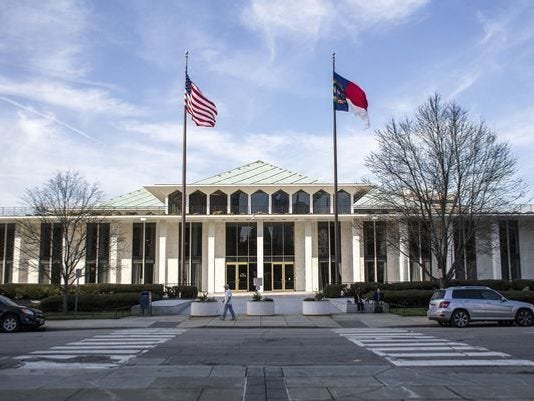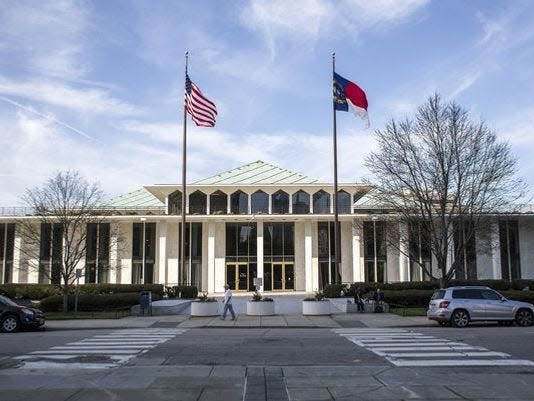Sheriff group: release names of 'dangerous' juveniles, make it easier to interrogate
North Carolina General AssemblyAn influential law enforcement group said it will keep pushing legislators to pass a bill to make it easier for officers to release names of juveniles and to interrogate them.Senate Bill 303, with a short title of "Strengthen Juvenile Laws," passed the upper chamber of the Republican controlled General Assembly 45-1 and moved to the House in April, but has not advanced since then.Still, on Aug. 7, the North Carolina Sheriffs' Association said it will continue to seek the bill's passage. SB303 would allow the public release of names, pictures and other information about juveniles for whom officers are searching and deem dangerous. The proposed law would also make it easier to interrogate 16- and 17-year-olds."This is a high priority for the Sheriffs' Association," said Eddie Caldwell, the group's executive vice president."It’s all about capturing violent criminals and taking them off the street before they hurt anyone else," Caldwell said.But critics say s


An influential law enforcement group said it will keep pushing legislators to pass a bill to make it easier for officers to release names of juveniles and to interrogate them.
Senate Bill 303, with a short title of "Strengthen Juvenile Laws," passed the upper chamber of the Republican controlled General Assembly 45-1 and moved to the House in April, but has not advanced since then.
Still, on Aug. 7, the North Carolina Sheriffs' Association said it will continue to seek the bill's passage. SB303 would allow the public release of names, pictures and other information about juveniles for whom officers are searching and deem dangerous. The proposed law would also make it easier to interrogate 16- and 17-year-olds.
"This is a high priority for the Sheriffs' Association," said Eddie Caldwell, the group's executive vice president.
"It’s all about capturing violent criminals and taking them off the street before they hurt anyone else," Caldwell said.
But critics say such public releases would brand children for life with crimes for which they might not be found guilty. That is because even though law enforcement web and social media sites would be wiped after a juvenile is taken into custody, the information would almost certainly persist online.
"This is specifically a concern for juveniles because they are more vulnerable," said Democrat Rep. Lindsey Prather from Buncombe County.
Prather, a former special education teacher, whose District 115 covers South Asheville and southwest Buncombe, pointed to the separate juvenile justice system created because children can't advocate for themselves as well as adults, she said, and because there is "more opportunity to redirect them."
The bill would work against that concept, she said.
The bill's sponsors include GOP Sen. Tim Moffitt of Henderson County, who did not return messages seeking comment.
The spokesperson for Democratic Buncombe County Sheriff Quentin Miller responded to an Aug. 7 request for comment saying Miller would not have time to review the legislation and comment that afternoon.
The proposed law would allow law enforcement to release the name, photograph, alleged offense and level of concern about the threat to others or the youth in question ― if there was an emergency or dangerous situation. In other circumstances, a court order would be required. After the emergency release of such information, the law enforcement agency would still need to seek a court order and if the court refuses must remove the information.
In order for law enforcement to interrogate a juvenile, a parent, custodian or guardian must be present. SB303 says if an adult from that category cannot be reached, a "caretaker" may instead be present. Those in that category include an adult member of the juvenile's household, juvenile detention staffer or "any employee or volunteer of a division, institution, or school operated by the Department of Health and Human Services."
More: Juvenile suspected in shooting at Asheville Juneteenth Festival
Search warrant: Student brought 'ghost gun' and ammunition to Erwin High School
Caldwell, with the sheriffs' association, said the change arose after killings involving juveniles in Orange and Robeson counties. In 2022 investigators found two teens dead in the woods in Orange County but were unable, they said, to ask the public for help finding the suspected killer, who was 17. Also last year, Robeson County officers said they were hampered by not being able to release information about the juveniles they believed were involved in a homicide.
They were on the loose, and officers could not release names or pictures, the association executive vice president said.
But Prather, the Buncombe legislator, said the examples, while tragic, did not justify the loss of those protections for minors.
"I think as a society, we are constantly trying to balance these things," she said.
Joel Burgess has lived in WNC for more than 20 years, covering politics, government and other news. He's written award-winning stories on topics ranging from gerrymandering to police use of force. Got a tip? Contact Burgess at [email protected], 828-713-1095 or on Twitter @AVLreporter. Please help support this type of journalism with a subscription to the Citizen Times.
This article originally appeared on Asheville Citizen Times: Sheriffs: release names of 'dangerous' juveniles, ease interrogations
What's Your Reaction?













